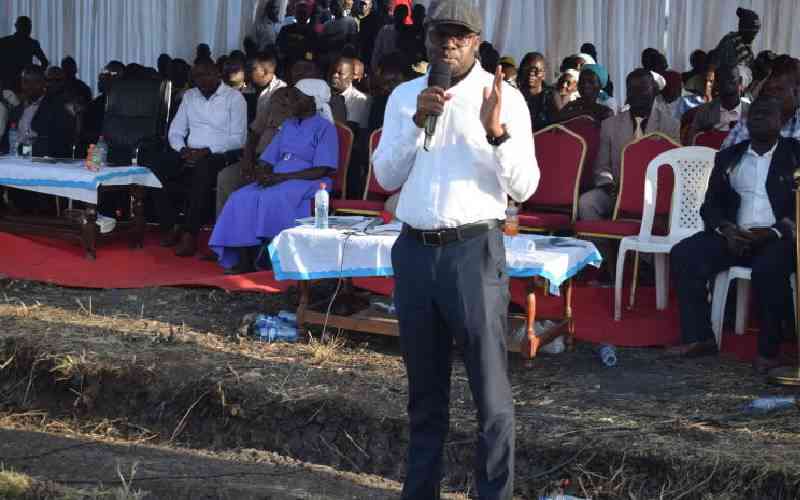Kenya: Kenya’s top television stations resumed broadcasting last evening after a 19-day stand-off with the communication regulator over digital migration with a message to Government: “We are here to stay and shall not cease to exist.’’
The stations owned by The Standard Group (KTN), Nation Media Group (NTV and QTV) and Royal Media Services (Citizen TV) vowed to resist any move to drive them out of television broadcasting.
In a terse statement issued before the resumption of TV broadcasting last evening, the resumption of TV broadcasting last evening, the three media houses said they were in Kenya to stay and would not close down. "Today, we choose to disappoint the shadowy forces to whom digital migration has been a pretext to subdue, weaken or altogether eliminate independent, privately-run television stations."
They went on: "To those forces we say, these broadcasters namely Citizen TV, QTV, KTN and NTV are here to stay and shall not cease to exist."
The statement was signed by the companies' Chief Executive Officers Sam Shollei (The Standard Group), Linus Gitahi (Nation Media Group) and Wachira Waruru (Royal Media Services).
The four stations resumed normal programming last evening on Africa Digital Network platform in Nairobi. Viewers can access the four stations through any free-to-air-compliant set-top box. Meanwhile ADN, which is a platform owned by the three companies, is finalising installation of infrastructure for other counties.
The three have endured a long struggle dating back to 2012, to be granted their own Broadcasting Signal Distribution (BSD) licence and frequencies covering the whole country.
They have been in and out of courts in efforts to have their ADN consortium brought to par with other signal distributors Signet and Pang, "who enjoy unusual support and protection by the government and in particular the Communications Authority of Kenya (CA)".
On February 14, CA officers accompanied by armed police officers raided their analogue signal relay stations in Limuru, forcibly switched off transmitters and carted away equipment.
This followed a Supreme Court ruling on February 13, which allowed the digital migration to proceed as scheduled by the CA.
The court ordered the CA to reinstate frequencies and a licence withdrawn from ADN following an advertising dispute.
The media houses have been pressing to be allowed ample time to set up their signal distribution infrastructure, having been allocated the frequencies only two weeks to the deadline for the first switch off.
They also want other carriers stopped from distributing their material without their consent as had been happening when they were on analogue platform.
Together, the stations accounted for more than 80 per cent of Kenya's television viewership.
Mishandled migration
Stay informed. Subscribe to our newsletter
"For millions of our viewers, the last two weeks have been difficult as they have been unprecedented. Never before, since the liberalisation of the country's airwaves have television broadcasts been interrupted or subjected to a crisis of the proportions just witnessed."
The CEOs added: "All this, we sadly note, transpired in the name of digital migration, a process that we maintain, has grossly been mishandled and continues to be."
The three have been granted a Self Provisioning License (SPL) and 21 frequencies to enable them to set up infrastructure for distribution of their own signal. "We asked for more time so that we could roll out a countrywide network to distribute our signals, but those pleas have fallen on deaf ears."
They added: "But we can announce today that through our self-provisioning digital signal carrier consortium, the Africa Digital Network Limited (ADN), we have now completed the installation of our digital signal distribution infrastructure around Nairobi. We are pleased to inform our esteemed viewers that tonight (yesterday), beginning 6.50pm, we are resuming regular programming across the 4 channels."
They said the four channels were and must remain free-to-air, available to all Kenyans without any monthly subscription on all universal decoders.
"We are in the process of importing our own set-top boxes (STBs) that would guarantee the right of all viewers to watch our channels free of charge just as they did before," the statement read.
They said even as they resumed broadcasts, many of the concerns they had articulated around the management of the digital migration process remained unresolved.
"The matter of copyright to our content and a guarantee of non-interference on our channels on Pay TV platforms remain particularly pertinent. We will continue pursuing a resolution to these and other outstanding issues in the best interest of our viewers, our journalism, our country and our business," they added.
CA told the Supreme Court last month that the interim licence given to ADN was a precursor to a full BSD. However, CA Director General Francis Wangusi insists the SPL was all the media houses would get to set up a Pay TV to carry their content.
 The Standard Group Plc is a
multi-media organization with investments in media platforms spanning newspaper
print operations, television, radio broadcasting, digital and online services. The
Standard Group is recognized as a leading multi-media house in Kenya with a key
influence in matters of national and international interest.
The Standard Group Plc is a
multi-media organization with investments in media platforms spanning newspaper
print operations, television, radio broadcasting, digital and online services. The
Standard Group is recognized as a leading multi-media house in Kenya with a key
influence in matters of national and international interest.
 The Standard Group Plc is a
multi-media organization with investments in media platforms spanning newspaper
print operations, television, radio broadcasting, digital and online services. The
Standard Group is recognized as a leading multi-media house in Kenya with a key
influence in matters of national and international interest.
The Standard Group Plc is a
multi-media organization with investments in media platforms spanning newspaper
print operations, television, radio broadcasting, digital and online services. The
Standard Group is recognized as a leading multi-media house in Kenya with a key
influence in matters of national and international interest.








